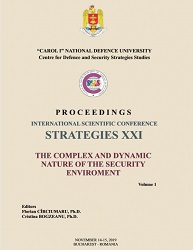A CONSTRUCTIVIST APPROACH TO STRATEGIC CULTURES
OF CHINA AND INDIA TOWARDS SOUTH ASIA:
ORIGINS, MANIFESTATIONS, AND IMPACT
ON REGIONAL SECURITY
A CONSTRUCTIVIST APPROACH TO STRATEGIC CULTURES
OF CHINA AND INDIA TOWARDS SOUTH ASIA:
ORIGINS, MANIFESTATIONS, AND IMPACT
ON REGIONAL SECURITY
Author(s): Shakaib RAFIQUE
Subject(s): International relations/trade, Security and defense, Developing nations, Geopolitics, Peace and Conflict Studies
Published by: Carol I National Defence University Publishing House
Keywords: Strategic Culture; Constructivism; Hindutva; Arthshastra; Confucian; Hegemony.
Summary/Abstract: The notion of strategic culture has gained pivotal significance in terms of foreignpolicy behaviors of Nation States today. This concept, coined by Jack Snyder, stands at the coreof comprehending the nature of inter-state relations and therefore serves as the crux of theforeign policy behaviors of modern Nation States. The notion of strategic culture hasconstructivist roots on one side, while on the other side it serves a blow to the ‘rational choicetheory’ as well. This paper is essentially aimed at employing the constructivist approach forunderstanding the constitutive elements of the strategic cultures of China and India towardsSouth Asia. This paper establishes that the roots of the strategic cultures of China and Indiatowards South Asia are essentially premised on their peculiar historical experiences,ideologies, notions and beliefs of their leadership towards the region. Furthermore, thestrategic cultures of both these countries are also guided by the “We” vs. “Others” notionsthat form the central core of a constructivist paradigm. The paper then argues that it is owingto the above characteristics that the strategic cultures of China and India differ so much fromeach other.
- Page Range: 41-58
- Page Count: 18
- Publication Year: 2019
- Language: English
- Content File-PDF

